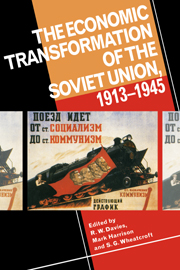Book contents
- Frontmatter
- Contents
- List of figures
- List of maps
- List of tables
- Notes on contributors
- Preface
- Acknowledgements
- Major events in Russian and Soviet economic development
- 1 Changing economic systems: an overview
- 2 The crooked mirror of Soviet economic statistics
- 3 National income
- 4 Population
- 5 Employment and industrial labour
- 6 Agriculture
- 7 Industry
- 8 Transport
- 9 Technology and the transformation of the Soviet economy
- 10 Foreign economic relations
- 11 The First World War and War Communism, 1914–1920
- 12 The Second World War
- Tables
- Glossary
- Notes
- Bibliography
- Index
8 - Transport
Published online by Cambridge University Press: 05 June 2012
- Frontmatter
- Contents
- List of figures
- List of maps
- List of tables
- Notes on contributors
- Preface
- Acknowledgements
- Major events in Russian and Soviet economic development
- 1 Changing economic systems: an overview
- 2 The crooked mirror of Soviet economic statistics
- 3 National income
- 4 Population
- 5 Employment and industrial labour
- 6 Agriculture
- 7 Industry
- 8 Transport
- 9 Technology and the transformation of the Soviet economy
- 10 Foreign economic relations
- 11 The First World War and War Communism, 1914–1920
- 12 The Second World War
- Tables
- Glossary
- Notes
- Bibliography
- Index
Summary
Russia is big, and the Russian Empire and its successor were even bigger. Political and economic cohesion depended on the means of transport. Water routes were traditionally important, whereas roads were few and nasty, but from the middle of the nineteenth century government-planned (and largely government-financed) railways were built, and these rapidly took the lion's share of the traffic originated by a fast-growing economy. In the twentieth century the railways were technically the most flexible mode of transport available and their relative importance increased in the first half of the century (see Table 32), in contrast to the United States where the railroads' share of freight traffic shrank from 75 per cent in 1929 to 62 per cent in 1939.
Stalin once went as far as an analogy between the function of Russia's railways and the British Empire's merchant navy, and it is clear what he meant. However, there was a fundamental difference in the economic situation of the railways in the late-tsarist industrialisation as compared with the Stalinist variant. Tsarist economic policy placed railway development in the forefront, as both end and means. In the Stalinist scheme of things, railways were simply means, an unwelcome necessity to be exploited for the benefit of production but benefitting as little as possible from that production. Under the five-year plans the USSR made a unique contribution to the history of railway transport, by carrying to extremes the policy of limiting investment while increasing traffic.
- Type
- Chapter
- Information
- The Economic Transformation of the Soviet Union, 1913–1945 , pp. 158 - 181Publisher: Cambridge University PressPrint publication year: 1993

